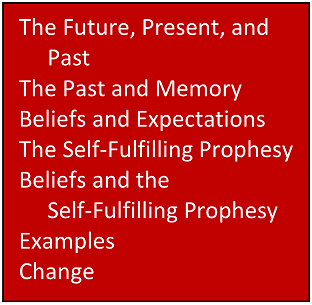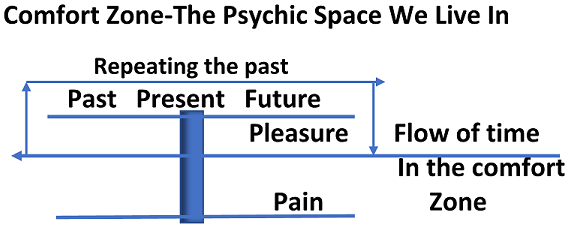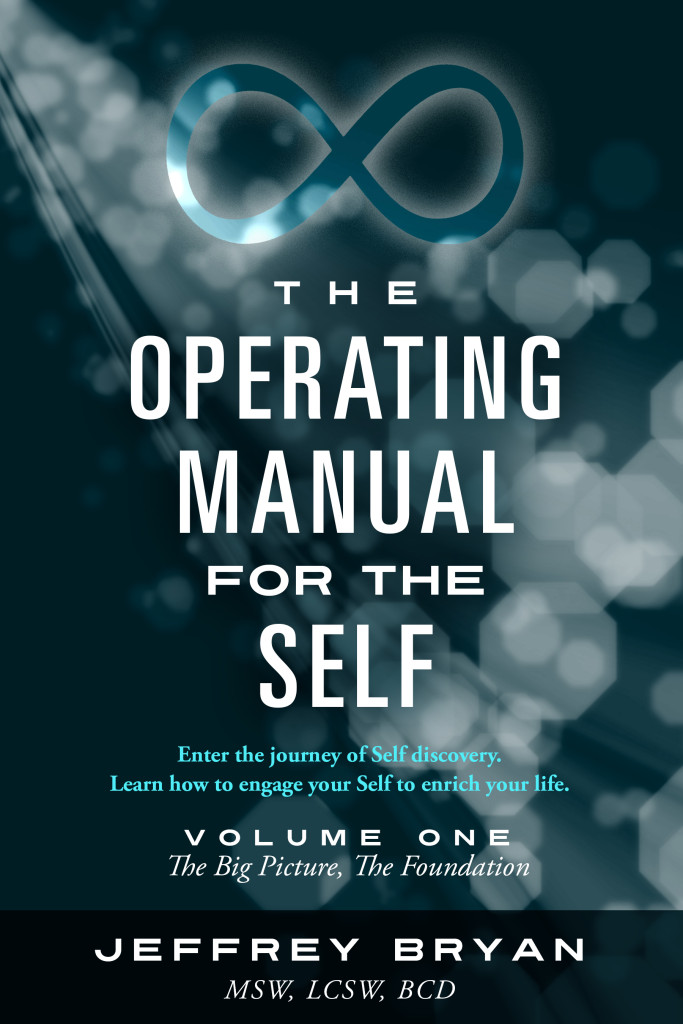The Past, Memories, Beliefs, and the Self-fulfilling Prophesy Pdf
Introduction: Future, Present, and Past
The future becomes our present, which then becomes our past. We then take that past and project it into the future, which becomes our present and then our past. In this cycle we are repeating the past. In most of our ordinary life this is ok, but there are important aspects of the past that we need to work with so as not to repeat these aspects again. Otherwise we create an unwanted future resulting in a frustrating and painful present. If we dissolve the influence of the past, we are then free to create the future we want, a future that becomes a more fulfilling present.
The past that we need to work with contains painful feelings. Here is where our ability to tolerate painful feelings becomes important because as we contact that past those painful feelings are triggered.
feelings becomes important because as we contact that past those painful feelings are triggered.
In the January 2018 letter we explored tolerating painful feelings and the comfort zone—becoming comfortable with painful feelings.
Our goal is to have the most pleasurable life we can experience. What are the aspects of the past that we project into the future? How does that future become our present? Painful experiences have generated beliefs that we project into the future along with expectations. Our expectations for the future become our present through the self-fulfilling prophesy. As we explore further, we will first lay the theoretical groundwork and then give examples of how this all fits together.
The Past and Memory
The past is composed of our memories and exists in our memories. Memory is a container holding thoughts, feelings, and a description of the context for those thoughts and feelings. We call the context an event—who participated, acted in what ways, when and where. We have positive memories and great memories of the past which can bring us great pleasure. Here we are focusing on painful memories.
Point of empowerment: We can take control of our thought processes and therefore control our memories. The importance of understanding that our past is contained in our memories is to see that we are not powerless in the face of our past.
Point of Empowerment: We will avoid memories that are unbearable painful. But they need to be dealt with. Expand the lower level of your comfort zone to be able to tolerate pain and to remember. (see January 2018 Letter.)
Beliefs and Expectations
A belief is a persistent idea that we hold over time about how we and the world work. Some beliefs are created from our childhood events and experiences in the form of “this is the lesson I learned from that experience.” This is a natural and useful process.
We experience painful events throughout our lives. As children and to some degree as adolescents, we were essentially powerless to affect the course of painful events. In the context of that powerlessness, significant painful events generated beliefs. We “learned our lesson and decided that this will never happen again to us.” The beliefs that we generate and carry forward with us into our future as adults, are beliefs that will protect us and make sure “it never happens again.” However, while we seek to prevent painful events from happening, we expect that they will.
There are also beliefs that are generated out of repeating experiences that contain significant amounts of discomfort. While the level of pain might not be great, it is the repetition of these experiences that feels unbearable. Beliefs are then generated out of these repeating experiences that create expectations about what the future holds.
Point of Empowerment: Powerful expectations about events to come in the future are one of the main factors determining what our future is going to be.
Point of Empowerment: In The Operating Manual for the Self the memories, thoughts, feelings, decisions, and expectations for the future are called an image. (Chapter 17)
The Self-Fulfilling Prophesy
Our expectations for the future create our present through the self-fulfilling prophesy. The self-fulfilling prophesy is a process made up of expectations for the future and anticipatory behavior that brings our expectations of the future into our present. Anticipating an expected painful event is the fearful experience of knowing that it is going to happen and feeling that it is inevitable—that there is nothing I can do to prevent it from happening. In anticipation of that event we behave in ways that we think will protect us but paradoxically, that behavior brings the expected event into our present.
Point of Empowerment: Anticipation creates the behavior that brings our expectations for the future into the reality of our present.
Beliefs and the Self-Fulfilling Prophesy
We have come full circle. In summary: our beliefs, generated from painful experiences in the past, have now created expectations for the future, which we make into a reality through our anticipatory behavior, the self-fulfilling prophesy at work.
Examples
Let’s examine some examples of how this process works. Before exploring painful and difficult aspects, let see what a positive example looks like.
- As a child my family had great vacations. I believe that I deserve to enjoy my vacation. I expect to have great vacations filled with fun. In anticipation I enjoy planning my vacation, looking forward to the fun. On vacation I find ways of enjoying it even if the weather is bad. If undesirable events occur, I make the best of them. Afterward I have memories of “another great vacation,” memories that reinforce my beliefs and expectation about having great vacations.
- At three years of age my brother scared me. I never fully trusted him after that. I learned, “Never fully let your guard down.” This is my belief, that I should never let my guard down fully. I expect that someone close to me will attack me and scare me. In anticipation of that I am defensive. My defensiveness sometimes provokes an attack from someone, which scares me. My behavior brought about the expected attack. This experience reinforces my belief that I should never let my guard down fully.
- In my teenage years I tried to become part of a group of friends but was rejected. This was extremely painful for me. I started to fear rejection. I hold the belief that I cannot handle rejection and must prevent that from happening again in the future. In anticipation of the rejection, I try to please everyone. Some people are contemptuous of this behavior and reject me for it. I have created the rejection I fear. Even though my behavior brought about the rejection I expect, I try harder to please everyone since this is my strategy to prevent rejection.
- My parent criticized me, calling me selfish, every time I put my needs before someone else’s. I felt very guilty. I decided that other people’s needs must be fulfilled first before I can fulfill my own needs. I sought to please others and avoid the painful criticism I expect to come my way. However, this leads to unhappiness and I brutally criticize myself for this behavior. Or, because of my deep resentment at being made to feel guilty, I decided that I should come first all the time. There have been people who criticize me and call me selfish. Both of these approaches reinforce my expectation that I will be criticized and called selfish for putting my needs first.
- My parents lived in Germany during WWII and experienced food rationing. “Better eat all of it now because you never know when food will be available again,” was their experience and the thinking behind an adaptive strategy that helped them survive. When I was growing up my mother went shopping once a week. If we were out of food (mostly favorite snack foods) I had to wait. Additionally, my siblings (three) and I competed for the limited supply of “goodies”. We impulsively ate what was available as we lived in the atmosphere our parent’s fear. I learned and came to believe, “You better eat what is available now because the food you want will run out and not be available.” Living in an atmosphere of fear, we ate out of fear. Now (at 50 years old), I compulsively over eat according to my childhood experience and the belief I have carried with me all my life. Though my expectation (that the food I want will be limited) is totally unrealistic, my childhood belief that I should eat in anticipation of a deprivation causes me to overeat.
Change
To end the repetitious cycles of bringing our past into the future and then into our present we need to:
- Notice a fearful expectation for the future and what we do in anticipation of the feared event
- Identify and change the beliefs and expectations generated by pain from the past
- Stop the very behavior that will bring about what is expected, the behavior in anticipation
- Claim our power as adults and avoid sinking into the powerlessness of childhood
- Realize that expected painful experiences in the future exist only in our imagination
- Imagine a future filled with new, desirable experiences
- Overcome our resistance to change (See newsletter February and March 2017 on resistance.)
Point of Empowerment: To prevent the process of change from feeling overwhelming take one step at a time and be patient with yourself.

Images determine our destiny. Consult The Operating Manual for the Self (Chapter 17—Images) for more information about how memories, thoughts, feelings, decisions, and expectations create images.
